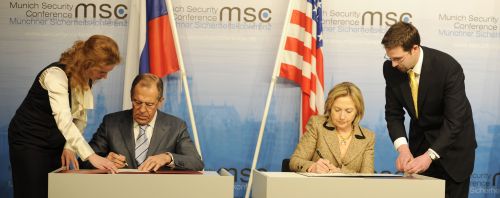10-year pact limits each side's strategic warheads and heavy bombers
MUNICH (AP) ― A new U.S.-Russia nuclear arms control treaty has taken effect, securing a key foreign policy goal of President Barack Obama and raising hopes among officials on both sides that it will provide the impetus for Moscow and Washington to negotiate further reductions.
“The treaty marks significant progress toward President Obama’s vision of a world without nuclear weapons,” U.S. Secretary of State Hillary Rodham Clinton said Saturday after exchanging ratification papers with Russian Foreign Minister Sergey Lavrov on the sidelines of an international security conference in Munich.
“Partnership with Russia is vital to our continued progress and to all that we hope to accomplish,” she said. “We must build the habits of cooperation that let us rise above our differences to address urgent matters of global security together.”
The New START treaty ― the first major revamping of nuclear disarmament deals since the late Cold War era ― was approved by the U.S. Senate in December after a bruising fight during which Obama pressed strongly for its passage. Russia ratified the deal last month.
 |
U.S. Secretary of State Hillary Clinton and Russian Foreign Minister Sergei Lavrov sign documents formally bringing into force the landmark nuclear arms reduction pact START at the 47th Munich Security Conference at the Bayerischer Hof hotel in the southern German city of Munich, Saturday. (AFP-Yonhap News) |
Russia’s Deputy Prime Minister Sergei Ivanov suggested that the two countries could build upon the new treaty in other areas, saying that “coordinated efforts” were needed in missile defense, and that Moscow also was willing to talk about tactical nuclear weapon reductions.
“We are ready to discuss this very complex topic in the framework of a comprehensive approach to strategic stability,” he said.
He also stressed that any “hypothetical” negotiations on tactical nuclear weapons “must take into consideration not only Russia’s or the U.S. nuclear arsenal but weapons systems of all nuclear and threshold” states.
The 10-year New START treaty, which can be extended by another five years, is a cornerstone of Obama’s efforts to “reset” U.S. relations with Russia, and Clinton called it a “milestone in our strategic partnership.”
“When it comes to the button that has worried us the most over the years ― the one that would unleash nuclear destruction ― today we take another step to ensure it will never be pushed,” Clinton told reporters after the treaty went into effect.
Lavrov said the treaty is in the national interests of both Russia and the United States.
“Both Russia and the U.S. share responsibility for security in the whole world,” he said through a translator.
The treaty builds on the original START, or Strategic Arms Reduction Treaty, initially proposed by then-U.S. President Ronald Reagan, which went into effect in 1994. The conclusion of the New START treaty comes the day before the 100th anniversary of Reagan’s birth.
New START, negotiated last year, limits each side to 1,550 strategic warheads, down from 2,200. It limits the number of deployed strategic launchers and heavy bombers to 700.
The pact also re-establishes a monitoring system that ended in December 2009 with the expiration of an earlier arms deal. Russia and the U.S. have the right to conduct onsite inspections beginning 60 days from the agreement going into effect Saturday.
The two countries have seven years to meet the treaty’s central limits.
Looking ahead, Clinton said the U.S. is in talks with Russia about how the two countries can further work together to address issues that affect their common security, while maintaining strategic stability.
Suggestions include joint analysis, joint exercises, and sharing of early warning data that could form the basis for a cooperative missile defense system, Clinton said.
She said she also would talk with Lavrov about “further arms control issues, including non-strategic and non-deployed nuclear weapons and our ongoing work to revive, strengthen and modernize the regime on conventional forces.”
German Foreign Minister Guido Westerwelle said New START’s conclusion marked “a very significant day for disarmament” and offered encouragement to pursue further progress.
“I particularly welcome the fact that the U.S. secretary of state now also wants to bring the issue of non-strategic nuclear weapons into the talks,” Westerwelle said. He hopes to secure the eventual removal of the remaining U.S. nuclear weapons stationed in Germany.
U.N. Secretary-General Ban Ki-moon said the treaty “adds significant impetus to the hard-won momentum achieved in recent years.”
“I believe that the entry into force of the New START treaty will inspire further action toward creating a safer and more secure world for all,” he said in a statement.
“I encourage the Russian Federation and the United States to continue their efforts to identify and carry forward the next steps, together with other nuclear-weapon states, in this historic endeavor of pursuing a nuclear weapon free world.”
Lavrov called New START “a product of the understanding that unilateral approaches to security are counterproductive.”
“The principles of equality, parity, equal and indivisible security ... form a solid basis for today’s Russian-American interaction in a range of areas,” Lavrov said. “The treaty that enters into force today will enhance international stability.”








![[Today’s K-pop] Blackpink’s Jennie, Lisa invited to Coachella as solo acts](http://res.heraldm.com/phpwas/restmb_idxmake.php?idx=644&simg=/content/image/2024/11/21/20241121050099_0.jpg)